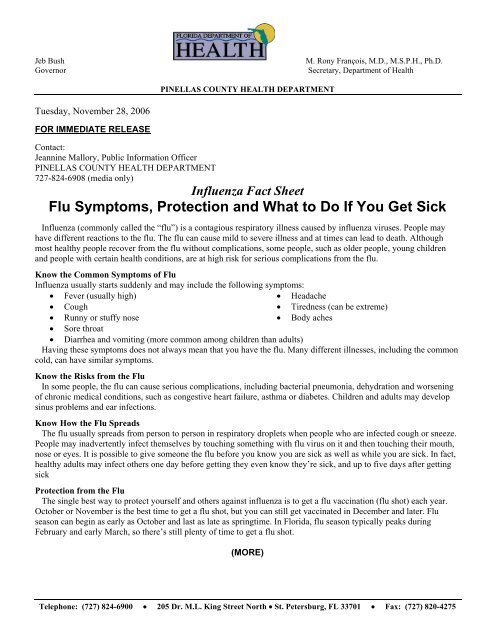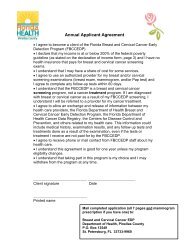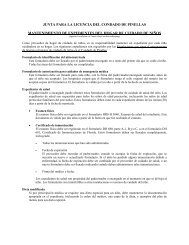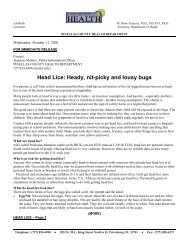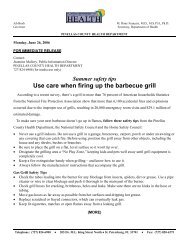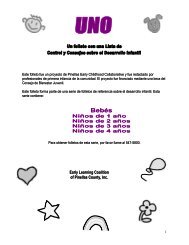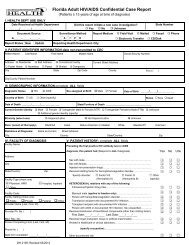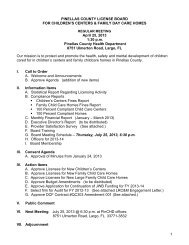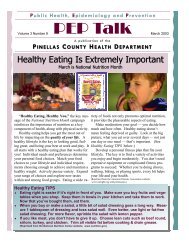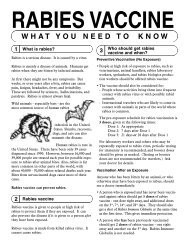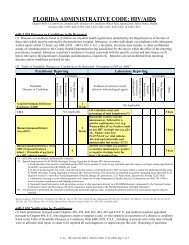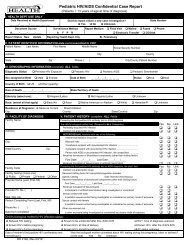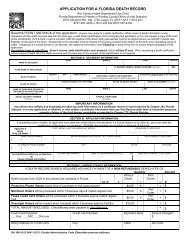Flu Symptoms, Protection and What to Do If You Get Sick
Flu Symptoms, Protection and What to Do If You Get Sick
Flu Symptoms, Protection and What to Do If You Get Sick
Create successful ePaper yourself
Turn your PDF publications into a flip-book with our unique Google optimized e-Paper software.
Jeb Bush<br />
Governor<br />
M. Rony François, M.D., M.S.P.H., Ph.D.<br />
Secretary, Department of Health<br />
PINELLAS COUNTY HEALTH DEPARTMENT<br />
Tuesday, November 28, 2006<br />
FOR IMMEDIATE RELEASE<br />
Contact:<br />
Jeannine Mallory, Public Information Officer<br />
PINELLAS COUNTY HEALTH DEPARTMENT<br />
727-824-6908 (media only)<br />
Influenza Fact Sheet<br />
<strong>Flu</strong> <strong>Symp<strong>to</strong>ms</strong>, <strong>Protection</strong> <strong>and</strong> <strong>What</strong> <strong>to</strong> <strong>Do</strong> <strong>If</strong> <strong>You</strong> <strong>Get</strong> <strong>Sick</strong><br />
Influenza (commonly called the “flu”) is a contagious respira<strong>to</strong>ry illness caused by influenza viruses. People may<br />
have different reactions <strong>to</strong> the flu. The flu can cause mild <strong>to</strong> severe illness <strong>and</strong> at times can lead <strong>to</strong> death. Although<br />
most healthy people recover from the flu without complications, some people, such as older people, young children<br />
<strong>and</strong> people with certain health conditions, are at high risk for serious complications from the flu.<br />
Know the Common <strong>Symp<strong>to</strong>ms</strong> of <strong>Flu</strong><br />
Influenza usually starts suddenly <strong>and</strong> may include the following symp<strong>to</strong>ms:<br />
• Fever (usually high)<br />
• Cough<br />
• Runny or stuffy nose<br />
• Sore throat<br />
• Headache<br />
• Tiredness (can be extreme)<br />
• Body aches<br />
• Diarrhea <strong>and</strong> vomiting (more common among children than adults)<br />
Having these symp<strong>to</strong>ms does not always mean that you have the flu. Many different illnesses, including the common<br />
cold, can have similar symp<strong>to</strong>ms.<br />
Know the Risks from the <strong>Flu</strong><br />
In some people, the flu can cause serious complications, including bacterial pneumonia, dehydration <strong>and</strong> worsening<br />
of chronic medical conditions, such as congestive heart failure, asthma or diabetes. Children <strong>and</strong> adults may develop<br />
sinus problems <strong>and</strong> ear infections.<br />
Know How the <strong>Flu</strong> Spreads<br />
The flu usually spreads from person <strong>to</strong> person in respira<strong>to</strong>ry droplets when people who are infected cough or sneeze.<br />
People may inadvertently infect themselves by <strong>to</strong>uching something with flu virus on it <strong>and</strong> then <strong>to</strong>uching their mouth,<br />
nose or eyes. It is possible <strong>to</strong> give someone the flu before you know you are sick as well as while you are sick. In fact,<br />
healthy adults may infect others one day before getting they even know they’re sick, <strong>and</strong> up <strong>to</strong> five days after getting<br />
sick<br />
<strong>Protection</strong> from the <strong>Flu</strong><br />
The single best way <strong>to</strong> protect yourself <strong>and</strong> others against influenza is <strong>to</strong> get a flu vaccination (flu shot) each year.<br />
Oc<strong>to</strong>ber or November is the best time <strong>to</strong> get a flu shot, but you can still get vaccinated in December <strong>and</strong> later. <strong>Flu</strong><br />
season can begin as early as Oc<strong>to</strong>ber <strong>and</strong> last as late as springtime. In Florida, flu season typically peaks during<br />
February <strong>and</strong> early March, so there’s still plenty of time <strong>to</strong> get a flu shot.<br />
(MORE)<br />
Telephone: (727) 824-6900 • 205 Dr. M.L. King Street North • St. Petersburg, FL 33701 • Fax: (727) 820-4275
Jeb Bush<br />
Governor<br />
M. Rony François, M.D., M.S.P.H., Ph.D.<br />
Secretary, Department of Health<br />
KNOW ABOUT THE FLU – Page 2<br />
PINELLAS COUNTY HEALTH DEPARTMENT<br />
Habits for Good Health<br />
The following additional measures can help protect against the flu. These steps may help prevent the spread of<br />
respira<strong>to</strong>ry illnesses such as the flu:<br />
• Cover your nose <strong>and</strong> mouth with a tissue when you cough or sneeze – throw the tissue away after you use it.<br />
• Wash your h<strong>and</strong>s often with soap <strong>and</strong> water or use an alcohol-based h<strong>and</strong> cleaner, especially after you cough<br />
or sneeze.<br />
• Avoid close contact with people who are sick. When you are sick, keep your distance from others <strong>to</strong> protect<br />
them from getting sick <strong>to</strong>o.<br />
• <strong>If</strong> you get the flu, stay home from work, school <strong>and</strong> social gatherings. In this way you will help prevent others<br />
from catching your illness.<br />
• Try not <strong>to</strong> <strong>to</strong>uch your eyes, nose, or mouth. Germs often spread this way.<br />
<strong>What</strong> <strong>to</strong> <strong>Do</strong> <strong>If</strong> <strong>You</strong> <strong>Get</strong> <strong>Sick</strong><br />
It is very difficult <strong>to</strong> distinguish the flu from other infections based on symp<strong>to</strong>ms alone. A doc<strong>to</strong>r's exam may be<br />
needed <strong>to</strong> tell whether you have developed the flu or a complication of the flu. There are labora<strong>to</strong>ry tests that can<br />
determine if you have the flu as long you are tested within the first two or three days of illness.<br />
<strong>If</strong> you develop flu-like symp<strong>to</strong>ms <strong>and</strong> are concerned about your illness, especially if are at high risk for<br />
complications of the flu or live with someone at risk, you should consult your health-care provider. Those at high risk<br />
for complications include people 65 years or older, people with chronic medical conditions, pregnant women, <strong>and</strong><br />
young children.<br />
Other Ways <strong>to</strong> Respond <strong>to</strong> the <strong>Flu</strong><br />
<strong>If</strong> you get the flu, get plenty of rest, drink a lot of healthy liquids <strong>and</strong> avoid using alcohol <strong>and</strong> <strong>to</strong>bacco. Also, you can<br />
take medications such as acetaminophen (e.g., Tylenol®) <strong>to</strong> relieve the fever <strong>and</strong> muscle aches associated with the flu.<br />
Important: Never give aspirin <strong>to</strong> children or teenagers who have flu-like symp<strong>to</strong>ms, particularly fever.<br />
For more information, visit www.cdc.gov/flu or www.PinellasHealth.com<br />
###<br />
The mission of the Pinellas County Health Department is <strong>to</strong> promote, protect <strong>and</strong> improve the health <strong>and</strong> safety of our<br />
community through public <strong>and</strong> private partnerships in an environment that respects diversity. www.PinellasHealth.com<br />
Telephone: (727) 824-6900 • 205 Dr. M.L. King Street North • St. Petersburg, FL 33701 • Fax: (727) 820-4275


